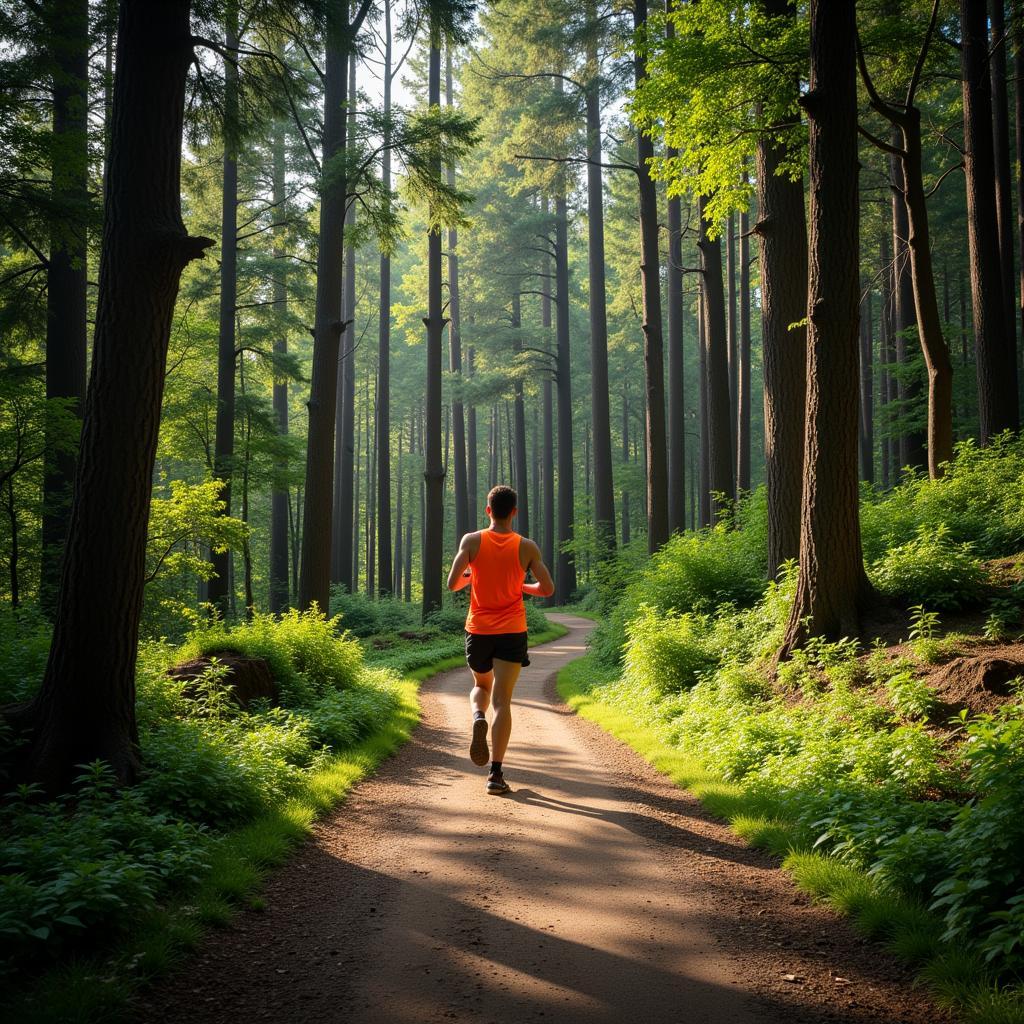Describing an outdoor activity you enjoy doing alone is a common topic in IELTS Speaking tests. This theme allows examiners to assess your ability to express personal preferences, describe experiences, and use vocabulary related to outdoor activities. Let’s explore how to approach this topic effectively to maximize your score.
Part 1: Introduction and Interview
In this section, the examiner may ask you some general questions about outdoor activities. Here’s a sample question with a suggested answer:
Examiner: Do you like outdoor activities?
Sample answer (Band 8-9):
Absolutely, I’m quite passionate about outdoor activities. There’s something invigorating about being in nature and engaging in physical pursuits outside. I find that outdoor activities not only help me stay fit but also provide a wonderful opportunity to clear my mind and reconnect with the natural world. Whether it’s hiking in the mountains or cycling through scenic routes, I always feel refreshed and energized after spending time outdoors.
 Hiker enjoying a scenic mountain view
Hiker enjoying a scenic mountain view
Part 2: Long Turn
Here’s a sample cue card related to the topic:
Describe an outdoor activity you enjoy doing alone
You should say:
- What the activity is
- Where you do it
- How often you do it
- And explain why you enjoy doing it alone
Sample answer (Band 8-9):
One outdoor activity I thoroughly enjoy doing alone is trail running. It’s an exhilarating form of exercise that combines the benefits of jogging with the beauty of nature.
I usually go trail running in a national park about 30 minutes from my home. The park has a diverse range of trails, from easy flat paths to more challenging routes with steep inclines and rocky terrain. This variety allows me to choose trails that match my mood and fitness level on any given day.
I try to go trail running at least twice a week, typically early in the morning before work or on weekends. The frequency depends on my schedule and the weather conditions, but I make it a priority to maintain this routine as much as possible.
There are several reasons why I particularly relish doing this activity alone. Firstly, it provides me with invaluable solitude and a chance to clear my mind. When I’m running alone on a trail, I can focus entirely on my thoughts, the rhythm of my breathing, and the natural surroundings. This meditative aspect of solo trail running is incredibly therapeutic and helps me alleviate stress.
Secondly, running alone allows me to set my own pace and challenge myself without feeling pressured by others. I can push myself harder on days when I feel energetic or take it easier when I need to recover, all without worrying about keeping up with or slowing down for a partner.
Lastly, I find that solo trail running enhances my connection with nature. Without the distraction of conversation, I’m more attuned to the sounds of birds chirping, leaves rustling, and my own footsteps on the trail. This heightened awareness of my environment is both calming and invigorating, leaving me feeling refreshed and rejuvenated after each run.
In essence, trail running alone is not just a physical activity for me, but a holistic experience that nourishes my body, mind, and soul.
 Trail runner enjoying a solitary run in a forest
Trail runner enjoying a solitary run in a forest
Examiner: Thank you. Now, let’s move on to some follow-up questions.
- Do you think it’s important for people to have hobbies they can do alone?
Sample answer (Band 8-9):
Absolutely, I believe it’s crucial for individuals to have hobbies they can pursue independently. Engaging in solitary activities fosters self-reliance and personal growth. It allows people to develop their interests at their own pace without external pressures. Moreover, having hobbies that don’t rely on others provides a valuable outlet for stress relief and self-reflection, which is essential for maintaining good mental health in our often hectic lives.
- What are the benefits of doing activities alone compared to in a group?
Sample answer (Band 8-9):
While group activities have their merits, solo pursuits offer unique advantages. Firstly, they provide unparalleled flexibility – you can engage in the activity whenever it suits your schedule without coordinating with others. Secondly, solitary activities often allow for deeper focus and concentration, enhancing skill development and personal enjoyment. Additionally, doing things alone can boost self-confidence and promote self-discovery, as you learn to rely on your own abilities and preferences without external influences.
Part 3: Two-way Discussion
Examiner: Let’s discuss outdoor activities in general. Do you think people nowadays spend enough time outdoors?
Sample answer (Band 7-8):
In my opinion, many people today don’t spend sufficient time outdoors. With the increasing prevalence of technology and indoor entertainment options, there’s a tendency to remain cooped up inside. This is especially true in urban areas where access to nature might be limited. However, I think there’s a growing awareness of the importance of outdoor activities for physical and mental well-being, which is gradually encouraging more people to seek out outdoor experiences.
Sample answer (Band 8-9):
I believe there’s a significant disparity in outdoor engagement among different demographic groups. While some individuals, particularly those who are health-conscious or nature enthusiasts, make a concerted effort to spend time outdoors, a considerable portion of the population falls short in this regard. The proliferation of digital devices and the demands of modern work life have contributed to a more sedentary, indoor-focused lifestyle. However, there’s an emerging trend of people recognizing the myriad benefits of outdoor activities, from improved physical health to enhanced mental well-being, which is slowly shifting societal attitudes towards prioritizing time spent in nature.
Examiner: How can governments encourage people to participate more in outdoor activities?
Sample answer (Band 7-8):
Governments can play a crucial role in promoting outdoor activities. They could invest in creating and maintaining public parks, hiking trails, and recreational areas to make outdoor spaces more accessible. Organizing community events or outdoor festivals could also raise awareness and interest. Additionally, governments might consider implementing policies that encourage businesses to provide employees with time off for outdoor activities or offering tax incentives for participating in certain outdoor programs.
Sample answer (Band 8-9):
Governments have a multifaceted role in fostering greater participation in outdoor activities. Firstly, they can implement comprehensive urban planning strategies that prioritize green spaces and outdoor recreational facilities, ensuring easy access for all citizens. Secondly, launching public awareness campaigns that highlight the health benefits of outdoor engagement could shift societal attitudes. Governments could also collaborate with educational institutions to integrate outdoor activities into school curricula, instilling an appreciation for nature from a young age. Furthermore, providing financial incentives, such as tax breaks for outdoor equipment purchases or subsidies for eco-tourism, could make outdoor pursuits more economically viable for a broader range of people. Lastly, enacting policies that protect natural areas and combat environmental degradation is crucial for ensuring that there are pristine outdoor spaces for future generations to enjoy.
 Government campaign promoting outdoor activities
Government campaign promoting outdoor activities
Key Vocabulary and Phrases
-
Exhilarating /ɪɡˈzɪləreɪtɪŋ/ (adjective): Making one feel very happy, animated, or elated.
Example: “The exhilarating feeling of reaching the mountain summit was worth all the effort.” -
Invigorating /ɪnˈvɪɡəreɪtɪŋ/ (adjective): Making one feel strong, healthy, and full of energy.
Example: “The invigorating mountain air refreshed me after the long hike.” -
To relish /ˈrelɪʃ/ (verb): To enjoy greatly.
Example: “I relish the opportunity to spend time alone in nature.” -
Therapeutic /ˌθerəˈpjuːtɪk/ (adjective): Having a good effect on the body or mind; contributing to a sense of well-being.
Example: “The therapeutic effects of outdoor activities on mental health are well-documented.” -
Holistic /həʊˈlɪstɪk/ (adjective): Characterized by the treatment of the whole person, taking into account mental and social factors, rather than just the symptoms of a disease.
Example: “Trail running provides a holistic approach to fitness, benefiting both body and mind.” -
To foster /ˈfɒstə(r)/ (verb): To encourage or promote the development of something.
Example: “Solo activities foster self-reliance and personal growth.” -
Concerted effort /kənˈsɜːtɪd ˈefət/ (phrase): A jointly arranged, planned, or carried out action.
Example: “Making a concerted effort to spend time outdoors can significantly improve one’s quality of life.” -
Myriad /ˈmɪriəd/ (adjective): Countless or extremely great in number.
Example: “There are myriad benefits to engaging in regular outdoor activities.”
Examiner’s Advice
To achieve a high score in the IELTS Speaking test when discussing outdoor activities:
- Use a wide range of vocabulary related to nature, physical activities, and personal experiences.
- Provide detailed and specific examples to support your points.
- Express your opinions clearly and justify them with logical reasoning.
- Use a variety of grammatical structures, including complex sentences.
- Maintain fluency by speaking at a natural pace and using appropriate linking words.
- Show enthusiasm for the topic through your tone and the content of your responses.
- Be prepared to discuss broader issues related to outdoor activities, such as environmental concerns or government policies.
Remember, practice is key to improving your speaking skills. Try recording yourself answering sample questions and listen back to identify areas for improvement. Good luck with your IELTS preparation!
Describe a sports activity you do to stay fit can be another interesting topic to explore if you’re looking to expand your vocabulary on physical activities and health.


